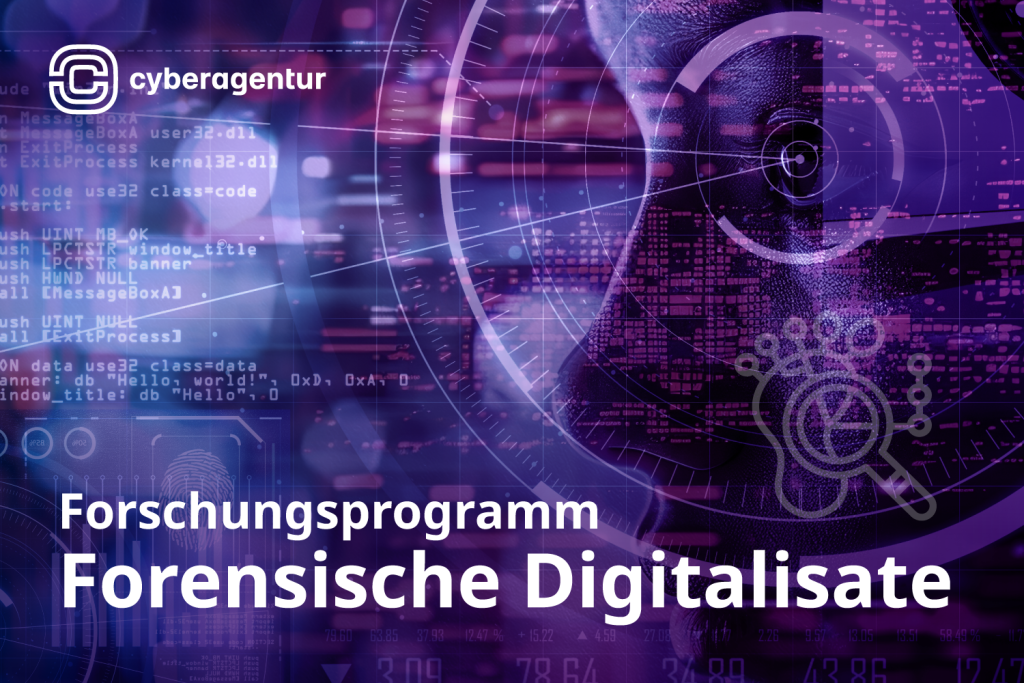Research program “Forensic digitized material” goes out to tender

The Agentur für Innovation in der Cybersicherheit GmbH (Cyberagentur) is launching the call for proposals for the “Forensic Digitized Data” research program on 20 May 2025. The aim is to develop a universal data format for analog and digital traces and to research new methods for automated trace correlation. Applicants can submit their concepts as part of an award procedure and thus lay the foundation for the forensics of the future.
The “Forensic digital evidence” research program addresses one of the central challenges of modern investigative work in order to efficiently bring together previously isolated analogue and digital traces – for example from telecommunications surveillance and smartphone forensics. Among other things, the aim is to obtain predictions about specific content, e.g. based on chat histories with individual contacts, and specific metadata (e.g. timestamps and location data) on a smartphone that has not yet been forensically examined. Among other things, this data is highly relevant if smartphones are difficult to forensically secure using security measures or have been manipulated before being secured. To this end, new methods are to be researched that compare divergent data sets, (semi-)automatically validate consistent traces and thus put investigations on a more stable footing. Another focus is on the possibility of calculating new criminally relevant evidence from existing analog and digital traces, such as reconstructing a gait pattern from an originally analog shoe print and a digital video recording or evaluating movement data more precisely.
The field of application of the research program is clearly defined: It is aimed at authorities and organizations with security tasks (BOS) and aims to sustainably strengthen the preservation of evidence in investigations. The results should contribute both to the defense against accusations of manipulation and to the more efficient collection of evidence. This represents a return to the technical diligence of classic forensics in the guise of modern technologies.
The research program is planned in two stages and will be designed as a PCP (Pre-Commercial Procurement) process. The first step is to develop an interoperable Digitalisat format. In a second step, exemplary methods for recalculating and validating information will be developed and tested. Here, great importance is attached to comprehensible, not exclusively AI-based methods. Strategies based on classic decision trees, statistical methods or algorithmic approaches will also be considered. The aim is a comprehensive performance comparison that systematically compares both novel and proven technologies and comprehensibly tests their suitability for forensic applications. The Cyberagentur is thus consciously drawing a lesson from current debates on the transparency and traceability of algorithmic procedures.
Til Weißflog, programme manager and expert for forensic digitization at the Cyberagentur, sees the “Forensic Digitization” research programme as “the basis for forensics that transfers the ancient art of preserving evidence into the digital age – robust, traceable and court-proof. After all, analog and digital evidence together have long defined the reality of modern investigations. But without common standards and robust, verifiable correlation techniques, they remain susceptible to information loss, errors, manipulation and doubt.”
With the publication of the “Forensic Digitization” call for proposals, the Cyberagentur is launching a research program in which interested consortia can participate in the award procedure from 20 May 2025. The competition is planned for a period of 4 years.
The invitation to tender was published in the Supplement to the Official Journal of the European Union with the contract notice number TED 322624-2025 was published. The end of the competition is 02.07.2025, 11:00 am.
Further information and registration:
